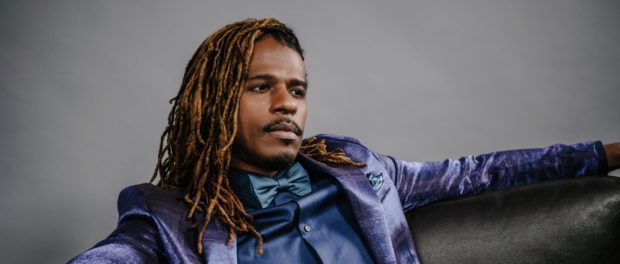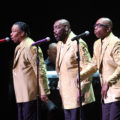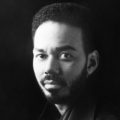“Imagining Marvin” with triple Grammy nominee, Broadway star Ryan Shaw

On the singer/songwriter side of his soulful personality, Ryan Shaw released three consecutive Grammy-nominated recordings, appeared on stages as prestigious as Carnegie Hall and The Kennedy Center, guested with numerous orchestras including the Chicago Symphony and even supported Van Halen on a coast to coast reunion.
His experience in theater is equally extensive, whether it was portraying Stevie Wonder in Broadway’s “Motown: The Musical,” embodying the Soul of Michael Jackson in “Thriller Live” on London’s West End or starring as Judas right here for the Lyric Opera’s Olivier Award-winning revival of “Jesus Christ Superstar.”
The brand new “Imagining Marvin” album finds this artist/actor settling snuggly between both artistic disciplines, paying tribute to fellow Motown legend Marvin Gaye with a theatrical flair, while incorporating personally-penned material that embraces the late great’s essence.
Shaw offered Chicago Concert Reviews several details surrounding the salute, a glimpse of what it was like to work with superstars such as Matchbox Twenty’s Rob Thomas and original Gaye collaborator Valerie Simpson, plus a peak behind the curtain of prior pinnacles.
 What did you hope to bring out in your “Imagining” Marvin” interpretations that weren’t on previous versions?
What did you hope to bring out in your “Imagining” Marvin” interpretations that weren’t on previous versions?
Shaw: The short answer is “Me.” The only way for this to work in an organic way was to put myself, my own phrasing and my own musicality into Marvin’s body of work. Other than that, it would have just been a regular covers record, which I did not want to do. Some of the songs were perfectly written, so it wasn’t necessary to add to the body of the song. So I added parts that weren’t on the original, like the vamp in “I Heard It Through The Grapevine.”
In what ways are your original songs for the album in the spirit of Marvin Gaye?
Shaw: Marvin, as many iconic artists from his time, was not just a musician, but also an activist. They would tackle, sometimes against popular opinion, political and social issues of the day. Some of the originals on this record are motivated by Marvin melodically. Some are motivated by Marvin lyrically or thematically.
How did you get hooked up with Rob Thomas for your collaboration “Love In Pain” and what was it like working with such a superstar?
Shaw: Rob and I were introduced by our publishers over at Round Hill Music. Thank you Amy Birnbaum! It was my second Zoom writing session since the pandemic started. The “Imagining Marvin” album was already done, but this song was so good and fitting that the album ended up with 11 tracks, instead of the original 10. Rob Thomas is an awesome and very down-to-earth collaborator. He is present and doesn’t wear his work on his sleeve, so it’s easy to create with him. His musicality and personality are second to none. We quickly became friends.
Was there any special insight your co-writer Valerie Simpson brought to “Strong Men Can,” considering she and her husband Nick Ashford were responsible for so many of the early Marvin Gaye smashes?
Shaw: The whole concept of the song was Valerie’s. Her musical instincts are always instantly classic and timely. The song speaks to mental health issues amongst men of the 21st century and breaking the destructive, stereotypical front that we have been made to believe we need to have to be a “Man,” which in itself is your right of passage with age. It can no more be earned other than by living. With living comes maturity, with maturity the acknowledgment of responsibility, and with active responsibility, wisdom. Everything else is a front built by those who refuse to do the aforementioned. Be strong, don’t cry, don’t appear soft or sensitive, [which is] all a front. We are humans. We came into this world with a cry. Trust me, it’s ok to do so as an adult.
 What did the guitar greats Derek Trucks and Robert Randolph add to the project?
What did the guitar greats Derek Trucks and Robert Randolph add to the project?
Shaw: Both Derek and Robert are probably some of the youngest living legends in the guitar world. They both have their own unique sound and playing style. I asked them just to bring themselves, and what they are known for to the song, and boy, did they deliver.
You also teamed with Broadway’s Shoshana Bean for “Good Lovin’ Ain’t Easy To Come By.” What attracted you to that duet, as opposed to one of the really obvious choices?
Shaw: I think that an artist is really better understood by the songs that weren’t number one, although I believe this song should have been a number one. It was important for me to know a bit more about Marvin as a human and how he saw himself as an artist, to give voice to all of that. I understudied Marvin Gaye in “Motown: The Musical” on Broadway. During the rehearsal process, [Motown founder] Mr. [Berry] Gordy told us many stories of Marvin and how he always wanted to be a crooner, but he was always pushed into the pop spotlight for obvious reasons. But the standards of the American songbook were always in his heart. So, for me, “Good Lovin’ Ain’t Easy To Come By” and “The Shadow Of Your Smile” are the broad strokes of Marvin.
How did playing fellow icon Stevie Wonder in “Motown: The Musical” prepare you for this sort of tribute?
Shaw: I feel like Marvin prepared me for those moments. When I first moved to New York, I would go to the open mics, and the first song that I sang that got everyone’s attention was “What’s Going On.” Flash forward to my third Grammy nomination, for my cover of The Beatles’ “Yesterday,” which was based on Marvin Gaye’s rather obscure version of the song. Then in “Motown,” I was Stevie Wonder, but as I said earlier, I also understudied Marvin and went on for him quite a few times. It was an amazing experience.
Shortly after, you appeared as Judas in “Jesus Christ Superstar” at the Lyric Opera right here in Chicago. What do you recall about that residency?
 Shaw: Nothing but good things! Chicago is a beautiful city in which I could definitely see myself living. The creative team and the cast were awesome. The production itself was massive. The 30-foot scaffolding that I had to climb every night and then symbolically hang myself from was exhilarating. Judas, as a character and historic figure, was very intense to put on myself every night and to go to the place of honest betrayal. Every night, to get to the place where my internal conflict was so much that although the audience hated me, they also felt for me too. It was something I’d love to tackle again when we can all breathe the same air. [I’m shaking my head].
Shaw: Nothing but good things! Chicago is a beautiful city in which I could definitely see myself living. The creative team and the cast were awesome. The production itself was massive. The 30-foot scaffolding that I had to climb every night and then symbolically hang myself from was exhilarating. Judas, as a character and historic figure, was very intense to put on myself every night and to go to the place of honest betrayal. Every night, to get to the place where my internal conflict was so much that although the audience hated me, they also felt for me too. It was something I’d love to tackle again when we can all breathe the same air. [I’m shaking my head].
How were you received opening for Van Halen’s reunion tour with David Lee Roth?
Shaw: That was the tour that cured me of stage fright. The most memorable thing that happened almost every concert for seven weeks was the lights going down on 20,000 to 30,000 Van Halen fans and the cheers that followed. Then the lights come up again and it’s not Van Halen, it’s me, and the boos that followed. Thankfully, I decided to start the show, not with a big band intro, but acapella [of Sam Cooke’s] “A Change is Gonna Come.” I would let a few of the boos subside and then I would start: “I was born by the river in a little tent…” Upon ending the first refrain, the crowd would go wild and I’d have them for the rest of my set. It was unnerving at first, then all fear went away. I was cured.
You’ve also played some of the world’s most prominent concert stages as a guest soloist. Were there any that especially stood out for you personally?
Shaw: My first time at Radio City [Music Hall] was probably the most stand out to me, because not only was it Radio City, but it was for the Dream Concert, which was a fundraiser to complete the building of the Martin Luther King, Jr. National Memorial in DC. And me being from Atlanta made that experience even more fulfilling.
How do you hope to perform or present the songs from “Imagining Marvin” during this unusual season with many in-person events on hiatus?
Shaw: That’s a good question that we are still trying to figure out as the world fluctuates between lockdowns and quarantines. At this point, December 2nd [was] my first live performance with a band streamed from Daryl’s House Club [run by Daryl Hall]. We will see what technology and healthcare has in store. But trust me, you’ll see me and my microphone popping up at every opportunity.
For additional information on Ryan Shaw, visit RyanShaw.com.








